How top diet apps hook you: behavioral design secrets
The hidden psychology behind popular diet apps and their success
The weight management industry is booming as health awareness and obesity rates rise. Products designed to help people maintain or optimize their weight are becoming increasingly popular.
In 2022, 43% of adults aged 18 years and over were overweight and 16% were living with obesity.
By 2030, nearly half of U.S. adults will be obese, including the nearly 1 in 4 who will have severe obesity. The obesity rate will surpass 50% in 29 states.
Compared to traditional dieting with paper journals or logging foods in Spreadsheets, weight loss apps offer more detailed and easy tracking and constant support.
Overall, around 50 percent of US consumers now report wellness as a top priority in their day-to-day lives, a significant rise from 42 percent in 2020.
Let’s take a sneak peek into some of the most popular nutrition applications that have been on the market for years and the ones that are introducing new solutions.
Psychology based vs Calories counting
Most diet apps aim to reduce calorie intake for direct weight loss, and only some apps focus on long-term healthy habits by studying how emotions influence eating.
These programs encourage mindful eating by understanding the reasons behind food choices, for example, overeating due to stress or boredom. Understanding motivations and developing coping strategies makes it easier to make healthier choices.
Eat Right Now app offers guided meditations, tools for mindful eating, and educational content to increase awareness and reduce stress eating. It helps users understand their cravings, make healthier choices, and build sustainable habits.
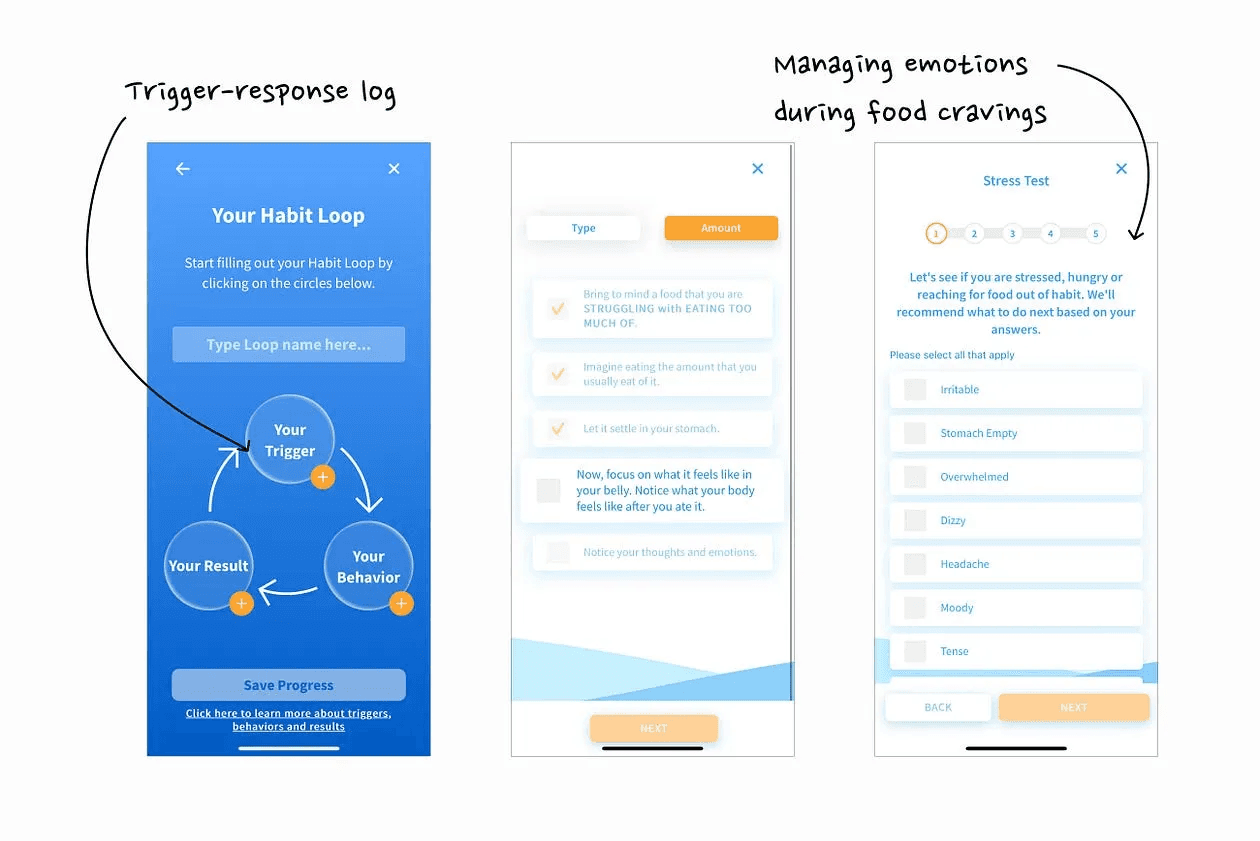
Eat Right Now app
Reduce pressure to deliver the results
Body weight was not gained in a day, and weight can not be lost in a day in healthy manner.
Psychological Pattern: By focusing on small, consistent steps and achievable goals, users start building healthy habits over time, leading to a more sustainable weight loss journey. Highlighting a gradual and pressure-free process reduces anxiety and increases long-term commitment.
Instead of promising quick wins, some applications take a gentle approach and tell users that weight loss should be pressure-free and gradual, it’s not a strict process everybody has to follow religiously. Highlighting a gradual and sustainable approach can reduce anxiety and increase long-term commitment.
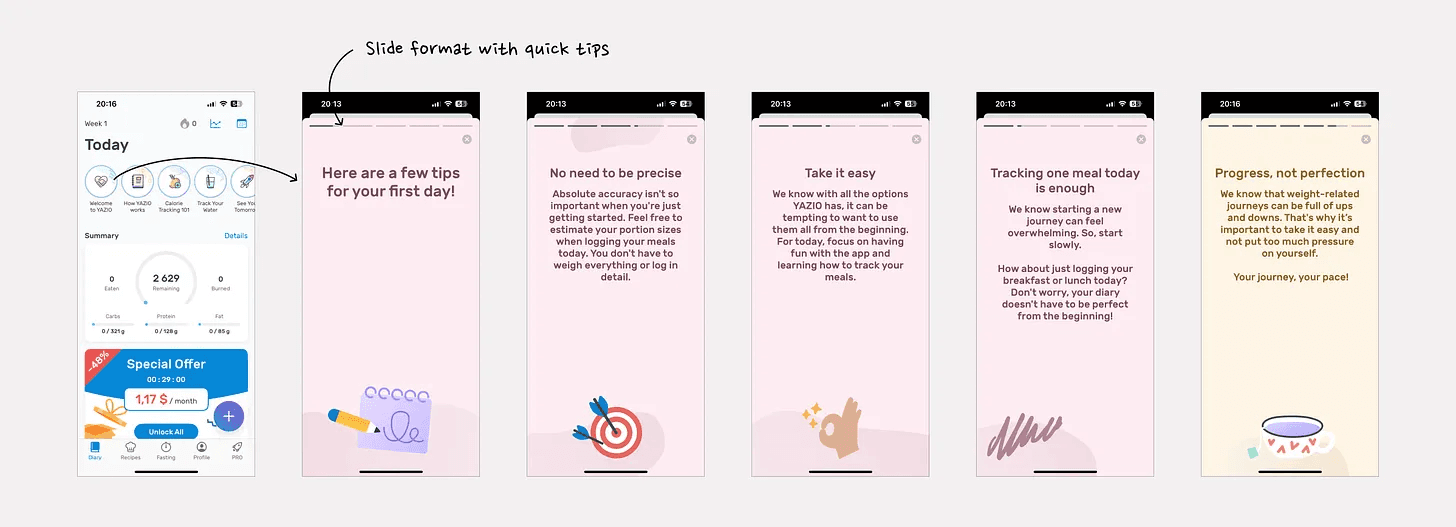
Yazio onboarding: no pressure onboarding
Prepare users for possible pitfalls
Educating users about potential setbacks and normalizing them can prevent discouragement. This prepares users for a realistic journey with ups and downs.
Commitment and Consistency
Principle: People strive to be consistent with their commitments and past behavior.
Psychological Pattern: Once people commit to a goal or action, they are more likely to follow through to maintain a positive self-image. This is known as the “commitment-consistency principle,” defined by psychologist Robert Cialdini.
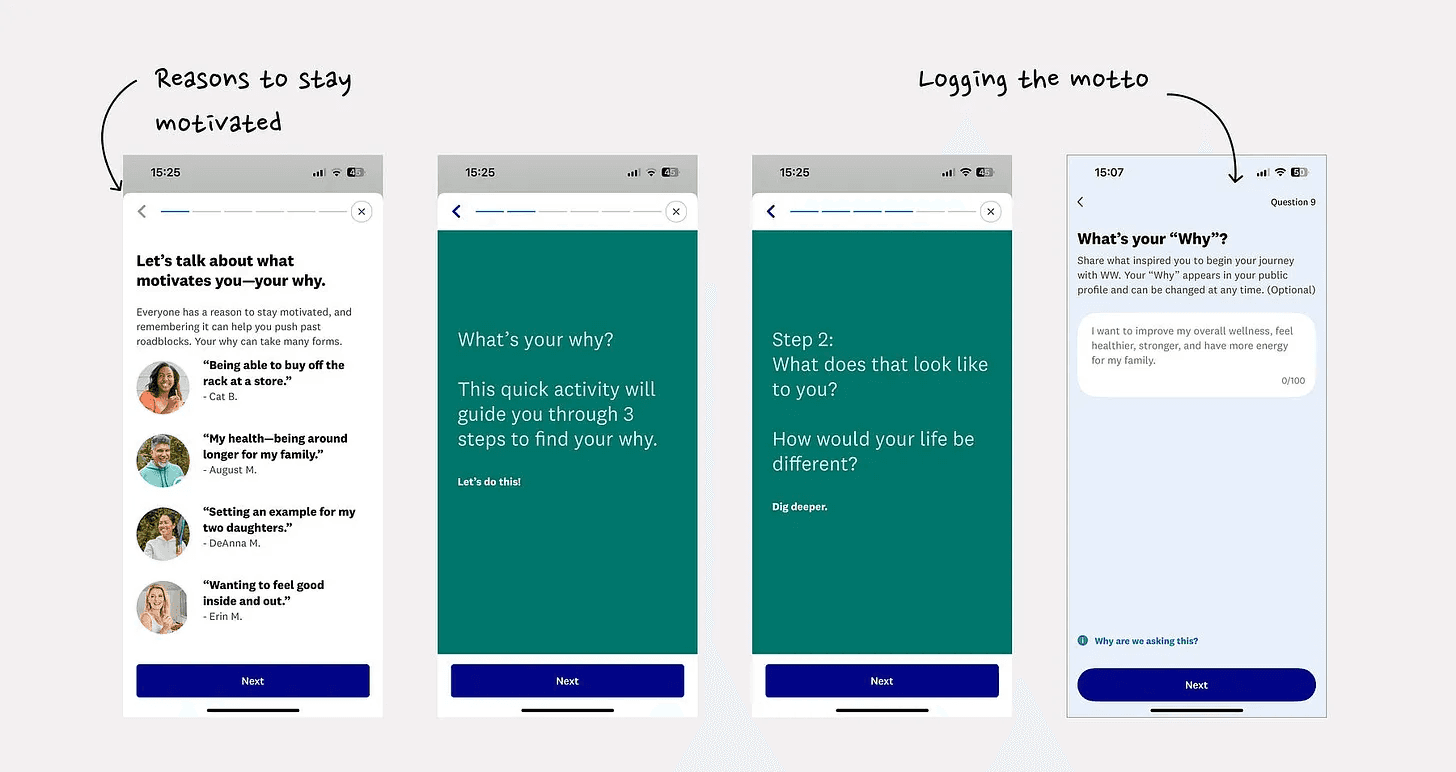
Weight Watchers app
A number of applications added conscious interaction with the commitment they are about to make — slowing down and pressing on the screen for a number of seconds as they think about their goal. Aside from that, they clarify the main reason why a user decided to commit to a weight loss program and remind them about it later.
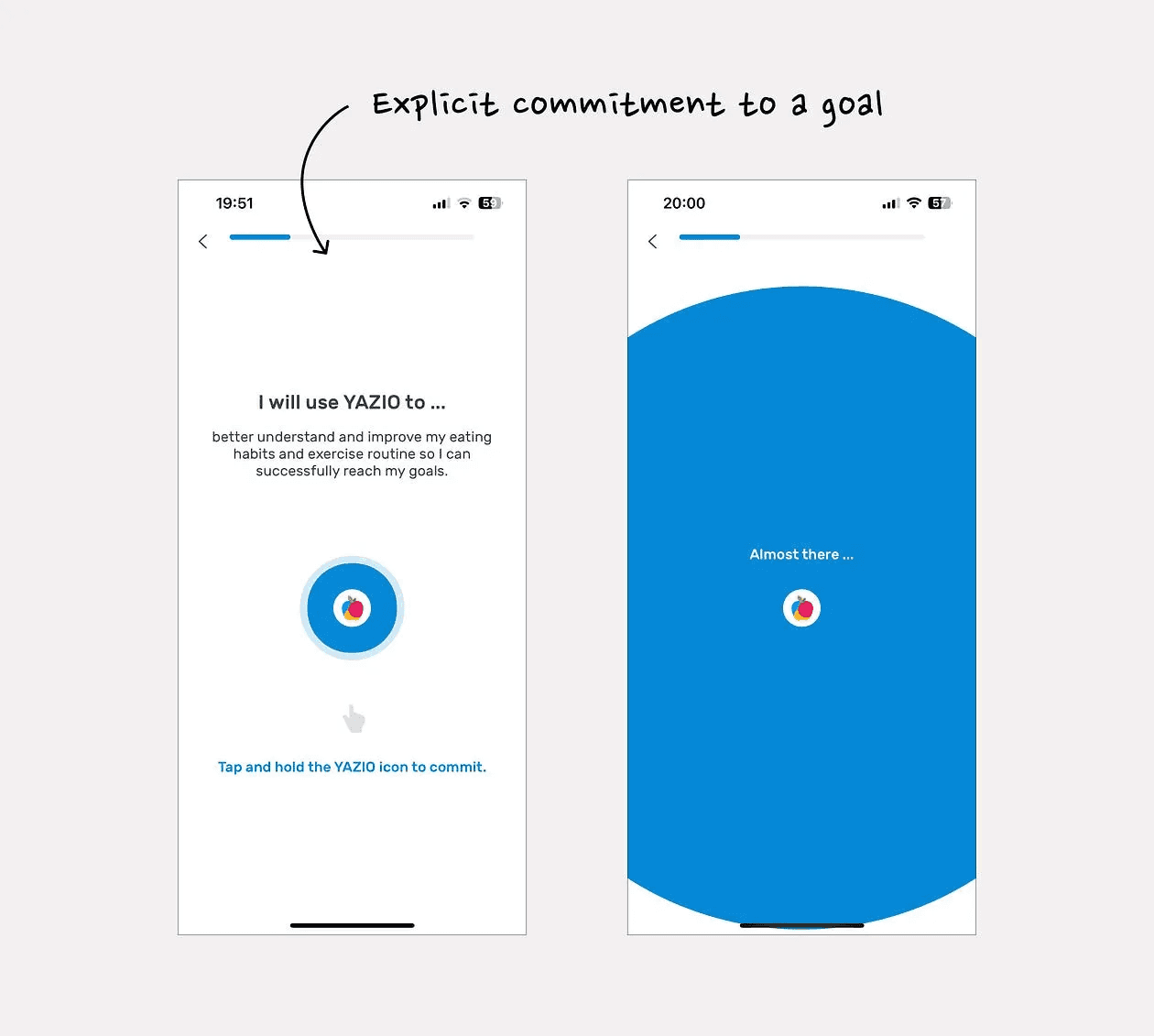
Yazio app
Goal Setting Theory
Principle: Specific and challenging goals, along with appropriate feedback, enhance performance.
Psychological Pattern: Setting clear, achievable goals helps users stay motivated and focused. According to Edwin Locke and Gary Latham’s goal-setting theory, specific goals (e.g., losing 1 pound per week or by X date) are more effective than vague ones (e.g., losing weight).
Commitment event as a deadline
Setting deadlines or commitments can enhance adherence to weight management programs and encourage users to stay on track. This deadline may be aligned with their planned significant events such as weddings, vacations, or reunions.
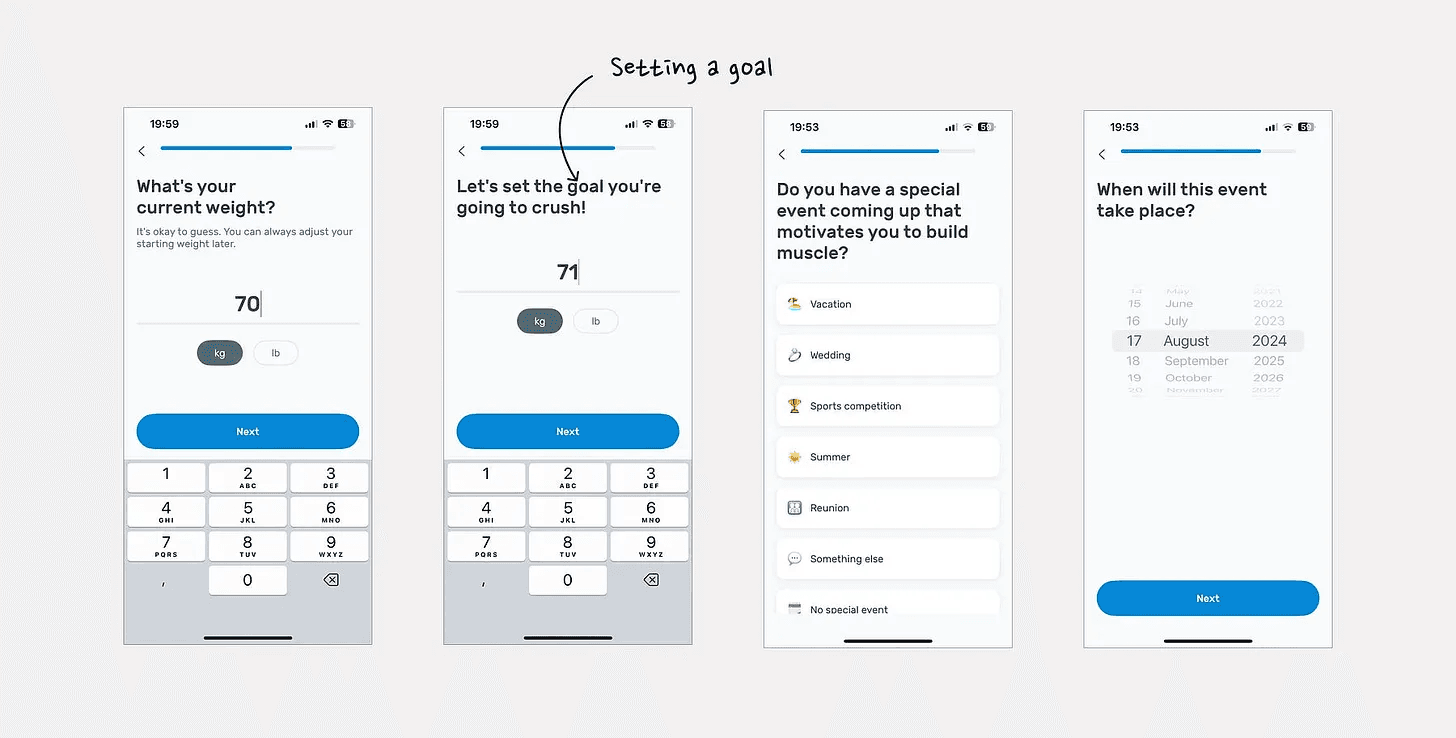
Goal setting in Yazio
SMART goals
SMART (Specific, Measurable, Achievable, Relevant, Time-bound) goals are a fundamental aspect of weight loss programs.
Repeating a goal reinforces commitment and consistency. It serves as a reminder of what the user wants to achieve, helping to keep the goal on top of their mind. Repetition also helps in maintaining motivation over time, making it easier to stick to healthy daily routines and long-term habits.
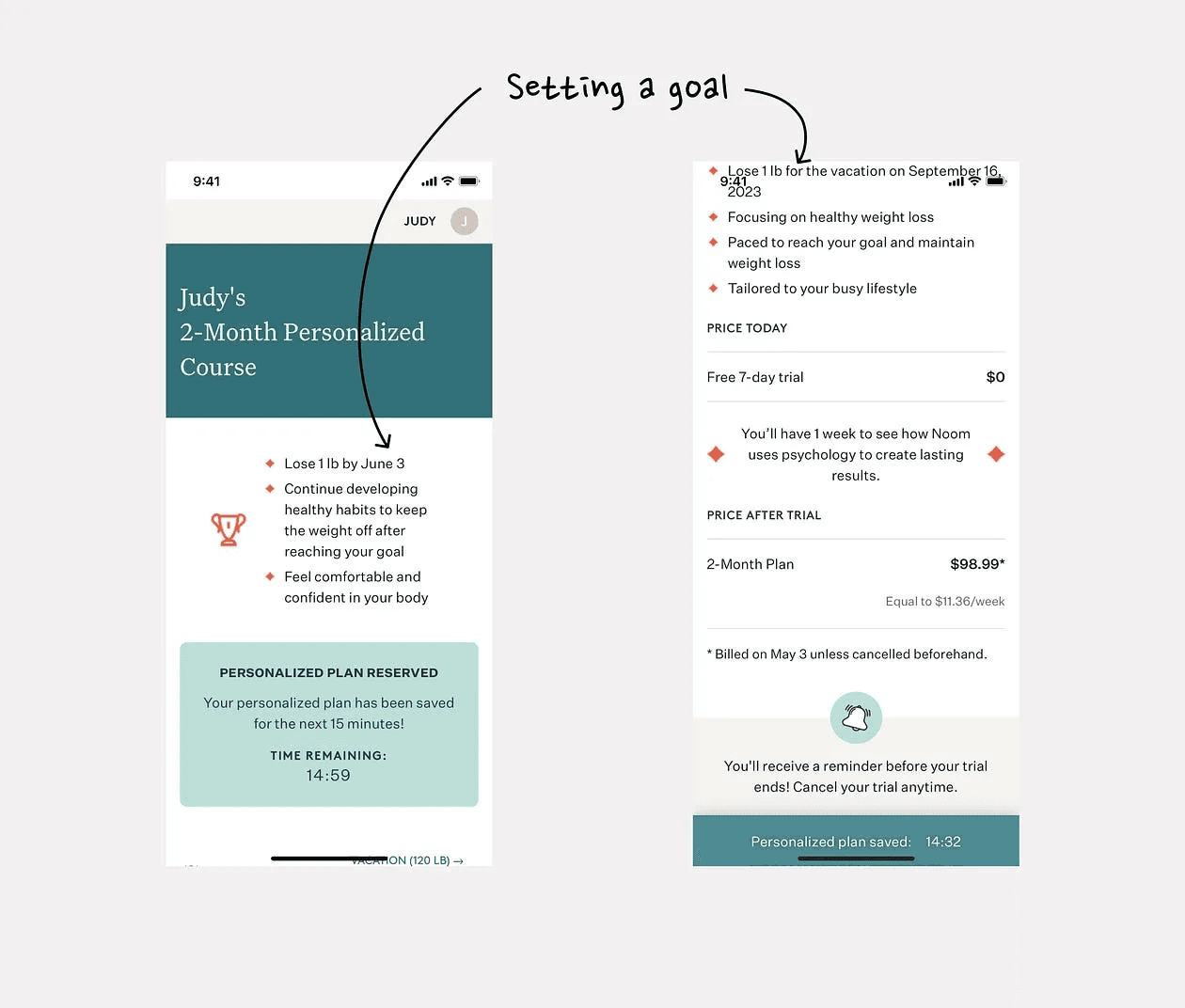
Noom program offering
Engagement techniques
Rewarding useful behavior
Behavior Effect: Behavior is influenced by the consequences that follow it. Positive reinforcement (rewards) and negative reinforcement (removal of negative outcomes) can encourage desired behaviors.
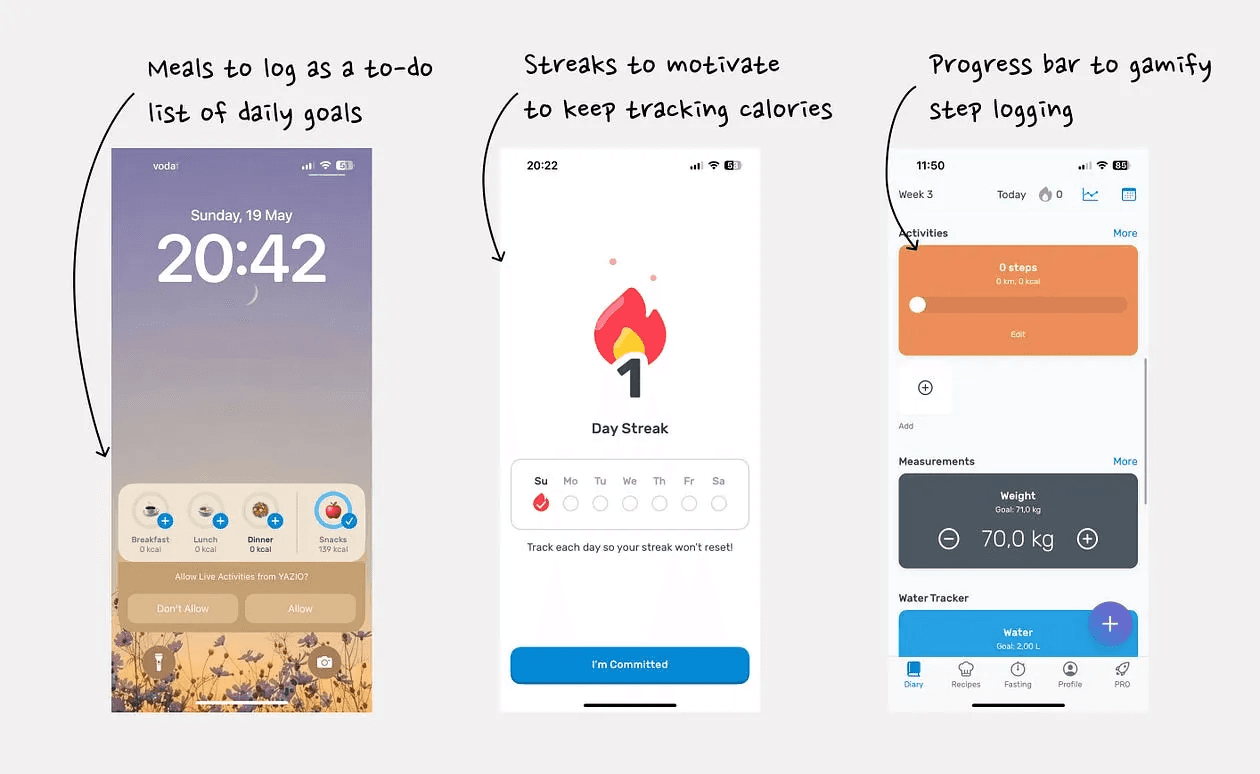
Apps using gamification
Yazio and Weight Watchers use gamification to motivate users to continue useful behaviors such as logging food.
Users may earn points for logging healthy meals, exercising, and meeting daily goals. This also creates a sense of achievement and progress, encouraging consistent healthy habits.
Introducing a point system for food tracking
Weight Watchers have introduced universal measurement — Points, and based on this system and the type of food a user eats they deduct a specific number of points from their daily budget. This way adding food intake feels like a game — “Will I use all of my points?”, “How many points are there left?”.
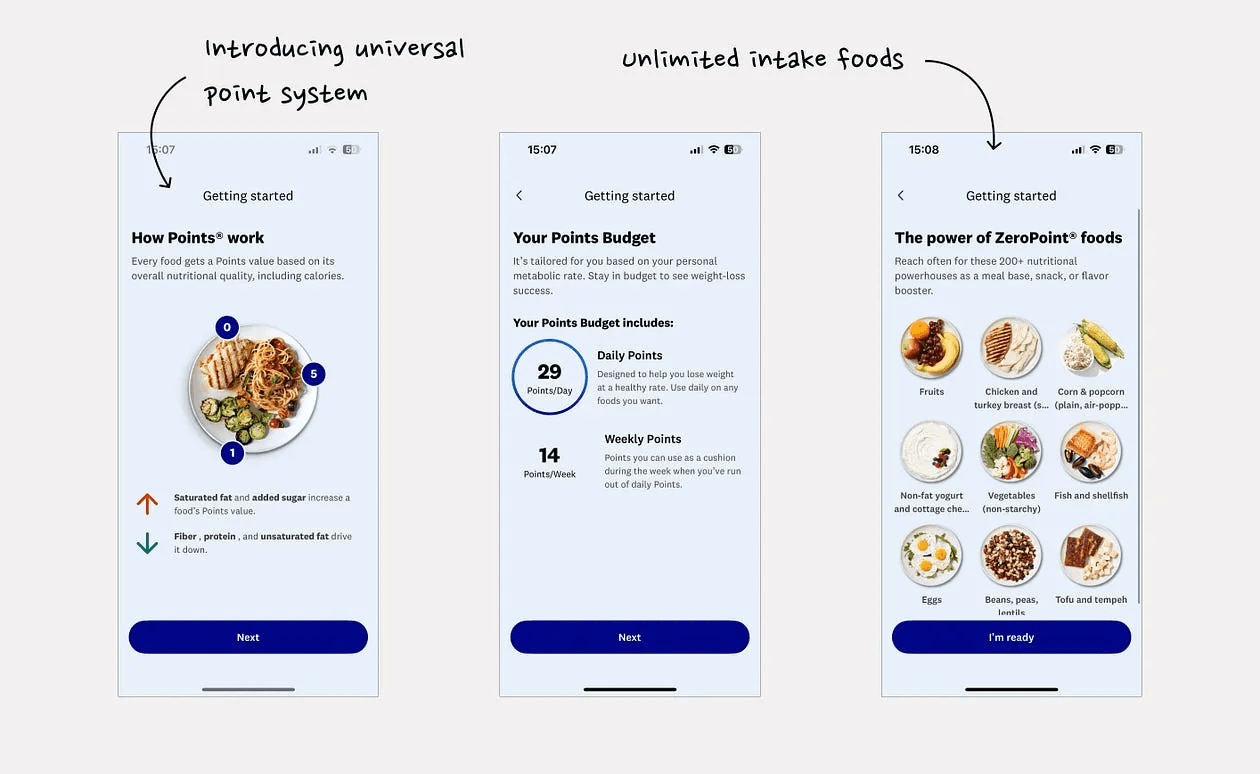
Weight Watchers app
Food logging
Automated Calorie Counting
Managing meals and food intake can be daunting and time-consuming, requiring significant discipline.
There are 3 main ways to log food intake to the app:
scanning barcode;
manual search in the database of the meals and foods;
based on the recipe from the app.
Some apps now allow users to scan their food, automatically counting the calories using the taken photo and AI algorithms. This reduces the manual effort and makes tracking food intake more convenient.
Social Cognitive Theory
Principle: People learn by observing others, through imitation, and modeling.
Behavior Effect: Seeing others succeed in weight management can boost a user’s confidence in their own ability to succeed. Health behaviors are contagious: people “mirror” the diet and physical activity choices of people around them.
Including success stories, community support, and peer mentoring can enhance self-motivation.
Contemplate app asks users to imagine their acquaintance achieving the goal and think of the specific steps that helped them achieve it.
Weight Watchers went ahead and created an ecosystem of groups and communities to keep users engaged.
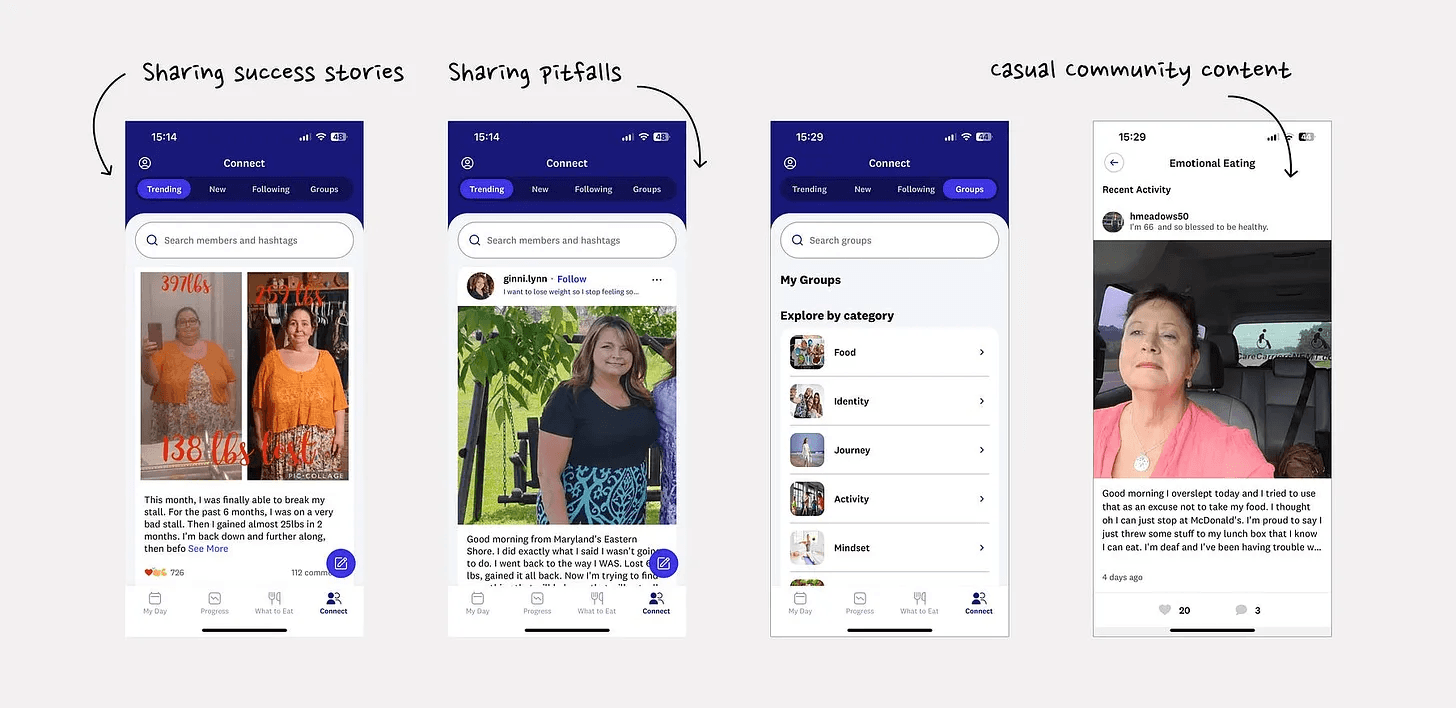
Weight Watchers and their community section
Support 24/7
Weight loss can feel isolating. With a chat available 24/7 in the app, users have permanent access to encouragement and advice, which can help them stay motivated as they reach their goals.
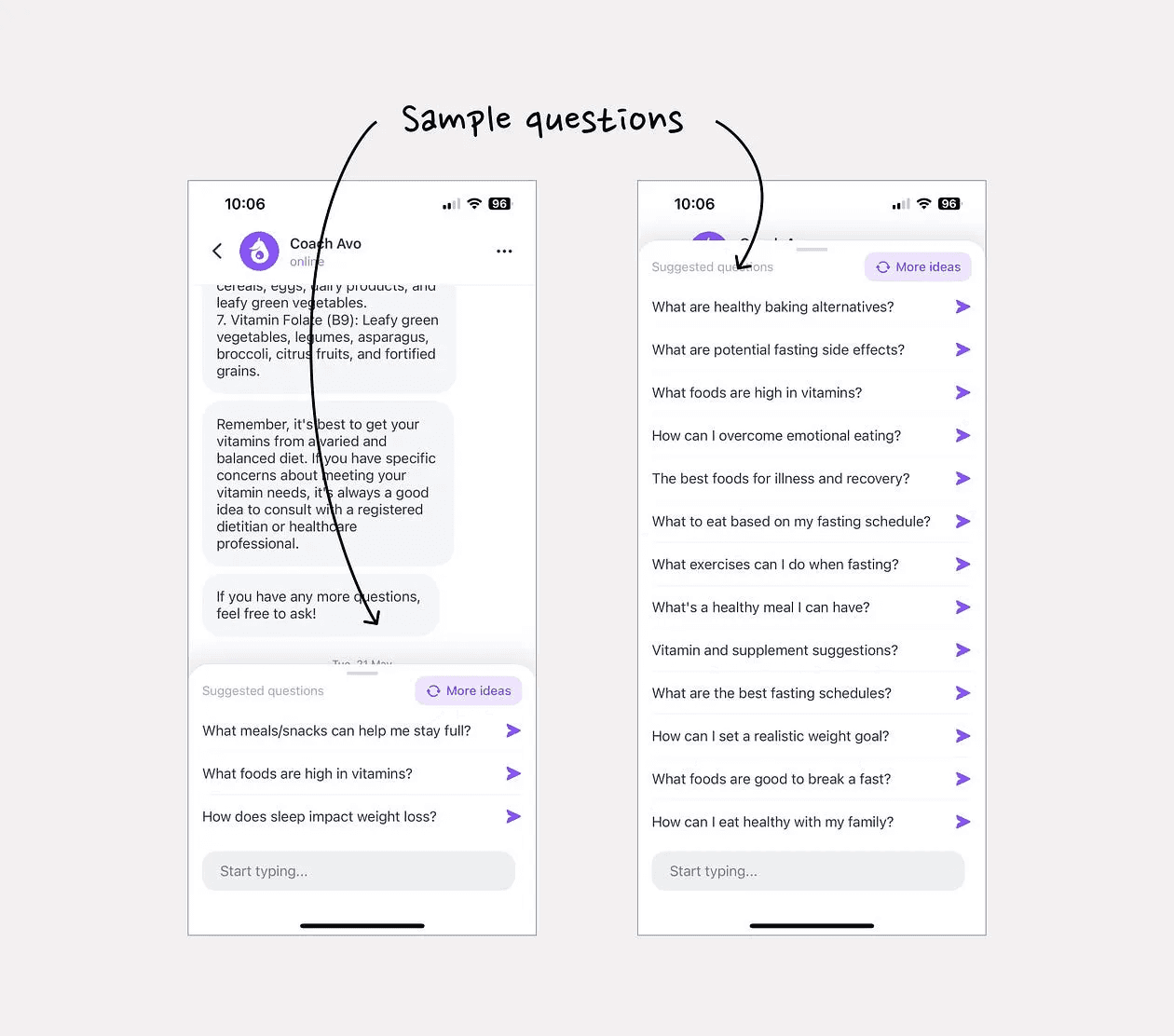
Chat support in Simple app
Chatbot can also be used to provide personalized support based on the type of diet a user follows or their preferences and goals.
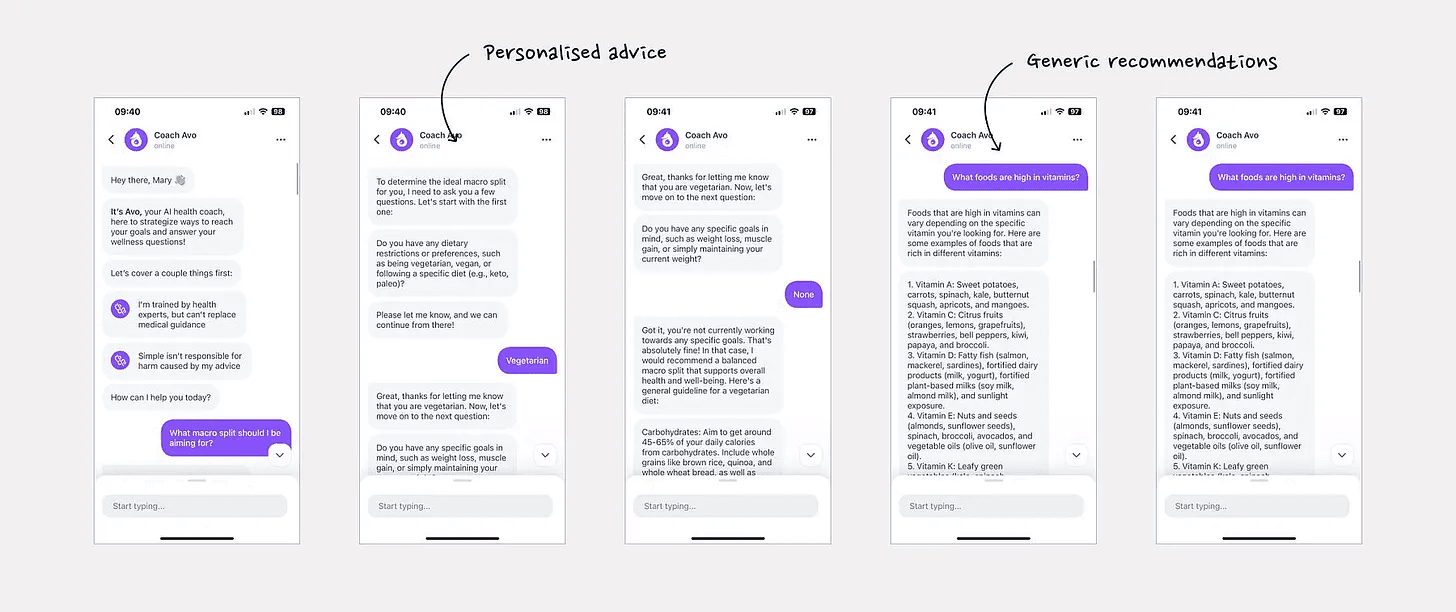
Chat support in Simple app
Bite-sized and personalised
Psychological Pattern: Our working memory has a limited capacity for information processing. With less information to process at once, users can grasp the information more easily. Users can quickly scan and find relevant information.
Weight loss apps make cooking more convenient by offering personalized options to suit each person’s preferences and needs. Yazio offers a number of filters such as calorie counting, cuisine-based, and type of cooking to cover all core use cases and personas and show only relevant recipes.
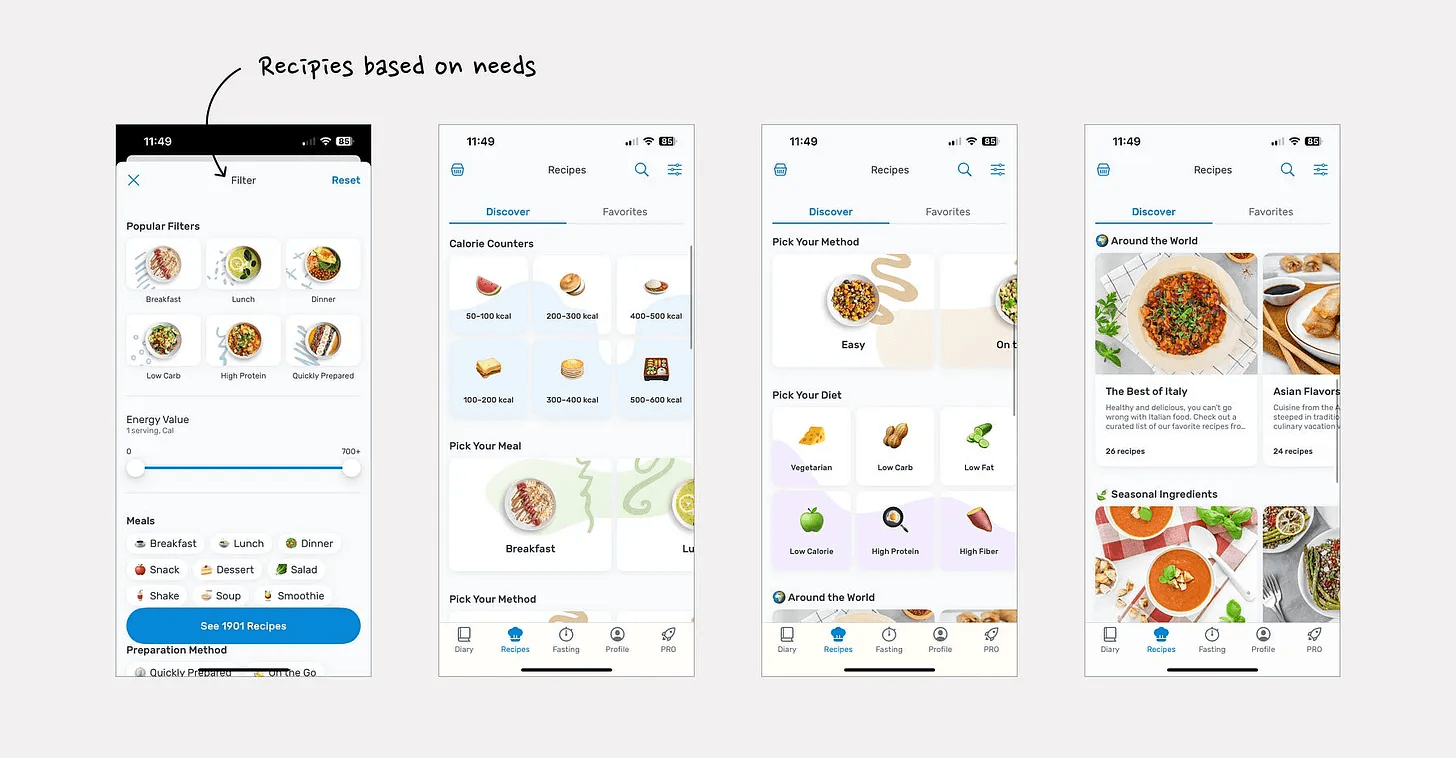
Yazio recipes
Bite-sized content design helps users easily grasp information. Minimalist slides are easy to scan and switch between, allowing users to quickly navigate and find the information they need.
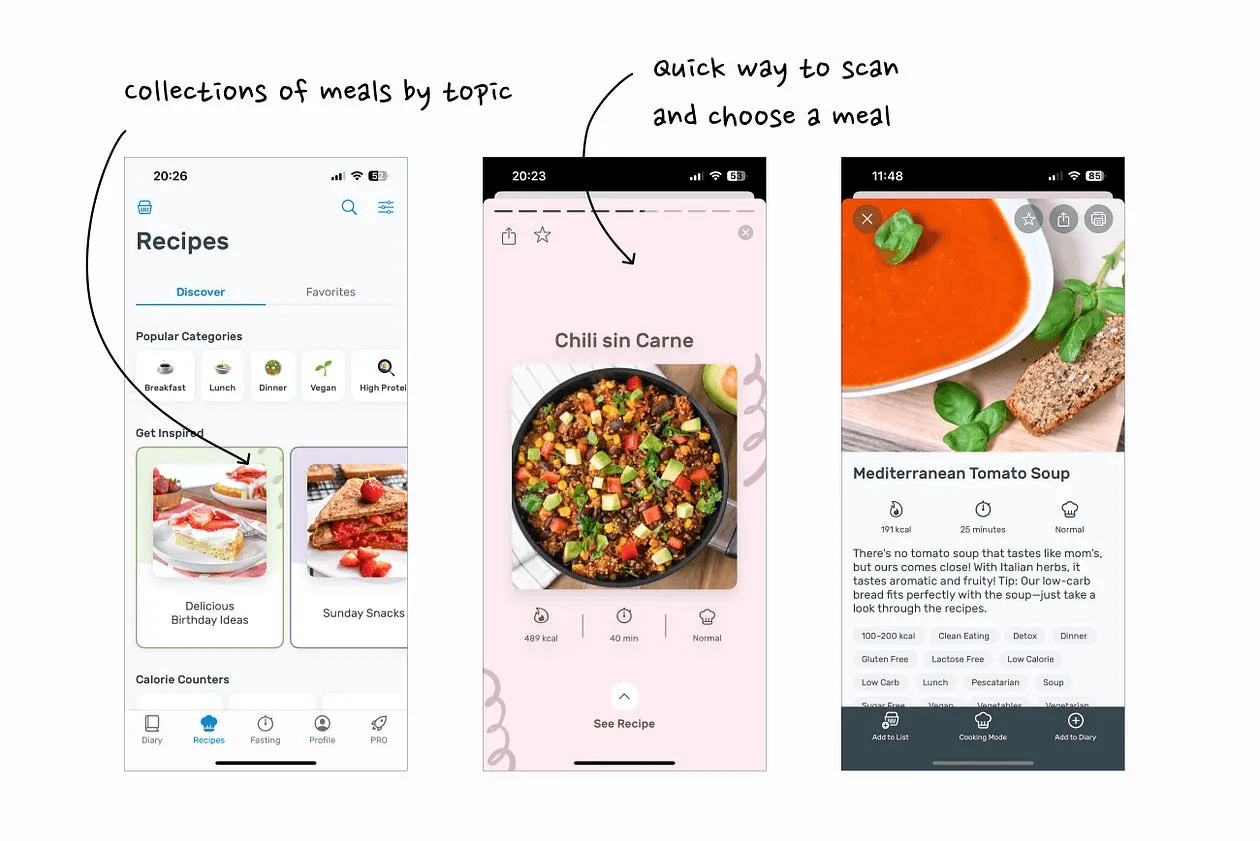
Yazio recipes
To summarize:
reinforce that weight loss is a slow and steady process;
emphasize healthy habits long term rather than just weight loss;
encourage self-compassion and discuss how to handle setbacks kindly;
track small wins and highlight small milestones;
use SMART goals to set users for success;
create online forums, and groups where users can connect, share experiences, and motivate each other;
break the content into small chunks and allow easy customization of the output.






